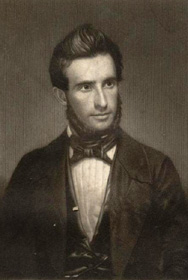Andrew Jackson Davis
| Andrew Jackson Davis | |
|---|---|

Andrew Jackson Davis, in 1847
|
|
| Born |
August 11, 1826 Blooming Grove, New York |
| Died | January 13, 1910 (aged 83) |
| Occupation | Spiritualist |
Andrew Jackson Davis (August 11, 1826 – January 13, 1910) was an American Spiritualist, born in Blooming Grove, New York.
He had little education, though probably much more than he and his friends pretended. In 1843 he heard lectures in Poughkeepsie on animal magnetism, as the phenomena of hypnotism was then termed, and found that he had remarkable clairvoyant powers. In the following year he had, he said, spiritual messages telling him of his life work. He eventually became known as "the Poughkeepsie Seer".
For the next three years (1844–1847) he practised magnetic healing with much success; and in 1847 he published The Principles of Nature, Her Divine Revelations, and a Voice to Mankind, which in 1845 he had dictated while in a trance to his scribe, William Fishbough. He lectured with little success and returned to writing (or dictating ) books, publishing about 30 in all including:
Davis was much influenced by Swedenborg and by the Shakers, who reprinted his panegyric praising Ann Lee in the official work, Sketch of Shakers and Shakerism (1884).
In writing his 1845 short story "The Facts in the Case of M. Valdemar", Edgar Allan Poe was informed by Davis's early work after having attended one of his lectures on mesmerism.
Davis's complete library is now housed within the Edgar Cayce Library. Davis coined the term "law of attraction".
Regarding Davis' book The Principles of Nature, Joseph McCabe has noted "There is no need to examine the book seriously. The scientific errors and crudities of it release any person from considering whether there was any element of revelation in it... Moreover, Davis was a palpable cheat. He maintained that up to that date he had read only one book in his life, and that book was a novel. We know from his admirers that this was not true, and any person can recognize in his pages a very crude and badly digested mess of early scientific literature."
...
Wikipedia
